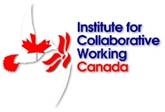Our Vision
To promote collaborative working to the benefit of Canadian enterprises and enhancing professional skills.
Our History
The Institute for collaborative working here in Canada has been established to provide a community of practice to enhance business success and is affiliated to ICW in the UK . The Institute was established as a Canadian Not for Profit corporation dedicated to the research, development, training and knowledge transfer of Relationships Management, Collaborative Working, and Relational Contracting.

“The ICW Canada was proud to have participated in the development of the world’s first international standard for collaborative working ISO 44001 and continues to play a leading role within The International Standards Organisation (ISO) in the development of supporting family of guidance standards.”
Integrated solutions are a common feature of today’s business world but historically many ventures have failed because, in the past, measuring or quantifying business relationship success has always been done after-the-fact based on the achievement of the desired outcome.
The challenge with this approach is that it rarely if ever established a definitive and scalable model that could proactively provide guidance. In other words, there was no way to reliably identify the potential gaps in a complex business arrangement and address them, before the initiative was well under way.
Given the continuing high rate of “complex” business relationship failures, something had to be done to create, from the beginning, a consistent approach that maintained the needed balance between a clearly defined process of continual engagement and individual case adaptability.
The publication of ISO 44001 establishes a framework to support a structured approach to successful relationship management outcomes . It has been created within the harmonised structure of management standards encompassing the eight-step life cycle of relationships model developed by our own David Hawkins . This enables organisations to identify gaps in their operational approach which may be obstacles to enhancing outcomes, structure more effective engagement and deliver improved joint performance .

